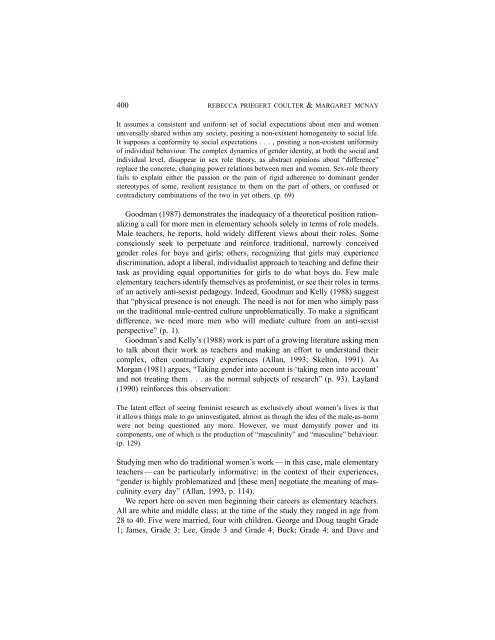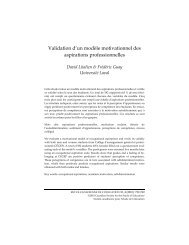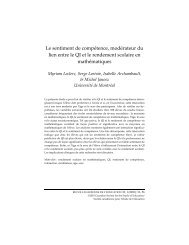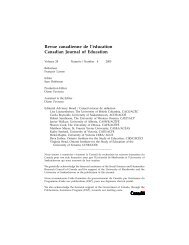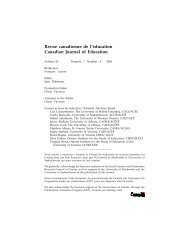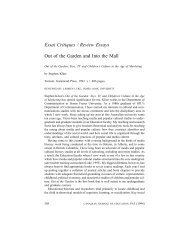Mireille Falardeau et Michel Loranger Le choix de stratégies ... - CSSE
Mireille Falardeau et Michel Loranger Le choix de stratégies ... - CSSE
Mireille Falardeau et Michel Loranger Le choix de stratégies ... - CSSE
Create successful ePaper yourself
Turn your PDF publications into a flip-book with our unique Google optimized e-Paper software.
400 REBECCA PRIEGERT COULTER & MARGARET MCNAY<br />
It assumes a consistent and uniform s<strong>et</strong> of social expectations about men and women<br />
universally shared within any soci<strong>et</strong>y, positing a non-existent homogeneity to social life.<br />
It supposes a conformity to social expectations . . . , positing a non-existent uniformity<br />
of individual behaviour. The complex dynamics of gen<strong>de</strong>r i<strong>de</strong>ntity, at both the social and<br />
individual level, disappear in sex role theory, as abstract opinions about “difference”<br />
replace the concr<strong>et</strong>e, changing power relations b<strong>et</strong>ween men and women. Sex-role theory<br />
fails to explain either the passion or the pain of rigid adherence to dominant gen<strong>de</strong>r<br />
stereotypes of some, resilient resistance to them on the part of others, or confused or<br />
contradictory combinations of the two in y<strong>et</strong> others. (p. 69)<br />
Goodman (1987) <strong>de</strong>monstrates the ina<strong>de</strong>quacy of a theor<strong>et</strong>ical position rationalizing<br />
a call for more men in elementary schools solely in terms of role mo<strong>de</strong>ls.<br />
Male teachers, he reports, hold wi<strong>de</strong>ly different views about their roles. Some<br />
consciously seek to perp<strong>et</strong>uate and reinforce traditional, narrowly conceived<br />
gen<strong>de</strong>r roles for boys and girls; others, recognizing that girls may experience<br />
discrimination, adopt a liberal, individualist approach to teaching and <strong>de</strong>fine their<br />
task as providing equal opportunities for girls to do what boys do. Few male<br />
elementary teachers i<strong>de</strong>ntify themselves as profeminist, or see their roles in terms<br />
of an actively anti-sexist pedagogy. In<strong>de</strong>ed, Goodman and Kelly (1988) suggest<br />
that “physical presence is not enough. The need is not for men who simply pass<br />
on the traditional male-centred culture unproblematically. To make a significant<br />
difference, we need more men who will mediate culture from an anti-sexist<br />
perspective” (p. 1).<br />
Goodman’s and Kelly’s (1988) work is part of a growing literature asking men<br />
to talk about their work as teachers and making an effort to un<strong>de</strong>rstand their<br />
complex, often contradictory experiences (Allan, 1993; Skelton, 1991). As<br />
Morgan (1981) argues, “Taking gen<strong>de</strong>r into account is ‘taking men into account’<br />
and not treating them . . . as the normal subjects of research” (p. 93). Layland<br />
(1990) reinforces this observation:<br />
The latent effect of seeing feminist research as exclusively about women’s lives is that<br />
it allows things male to go uninvestigated, almost as though the i<strong>de</strong>a of the male-as-norm<br />
were not being questioned any more. However, we must <strong>de</strong>mystify power and its<br />
components, one of which is the production of “masculinity” and “masculine” behaviour.<br />
(p. 129)<br />
Studying men who do traditional women’s work — in this case, male elementary<br />
teachers — can be particularly informative: in the context of their experiences,<br />
“gen<strong>de</strong>r is highly problematized and [these men] negotiate the meaning of masculinity<br />
every day” (Allan, 1993, p. 114).<br />
We report here on seven men beginning their careers as elementary teachers.<br />
All are white and middle class; at the time of the study they ranged in age from<br />
28 to 40. Five were married, four with children. George and Doug taught Gra<strong>de</strong><br />
1; James, Gra<strong>de</strong> 3; <strong>Le</strong>e, Gra<strong>de</strong> 3 and Gra<strong>de</strong> 4; Buck; Gra<strong>de</strong> 4; and Dave and


